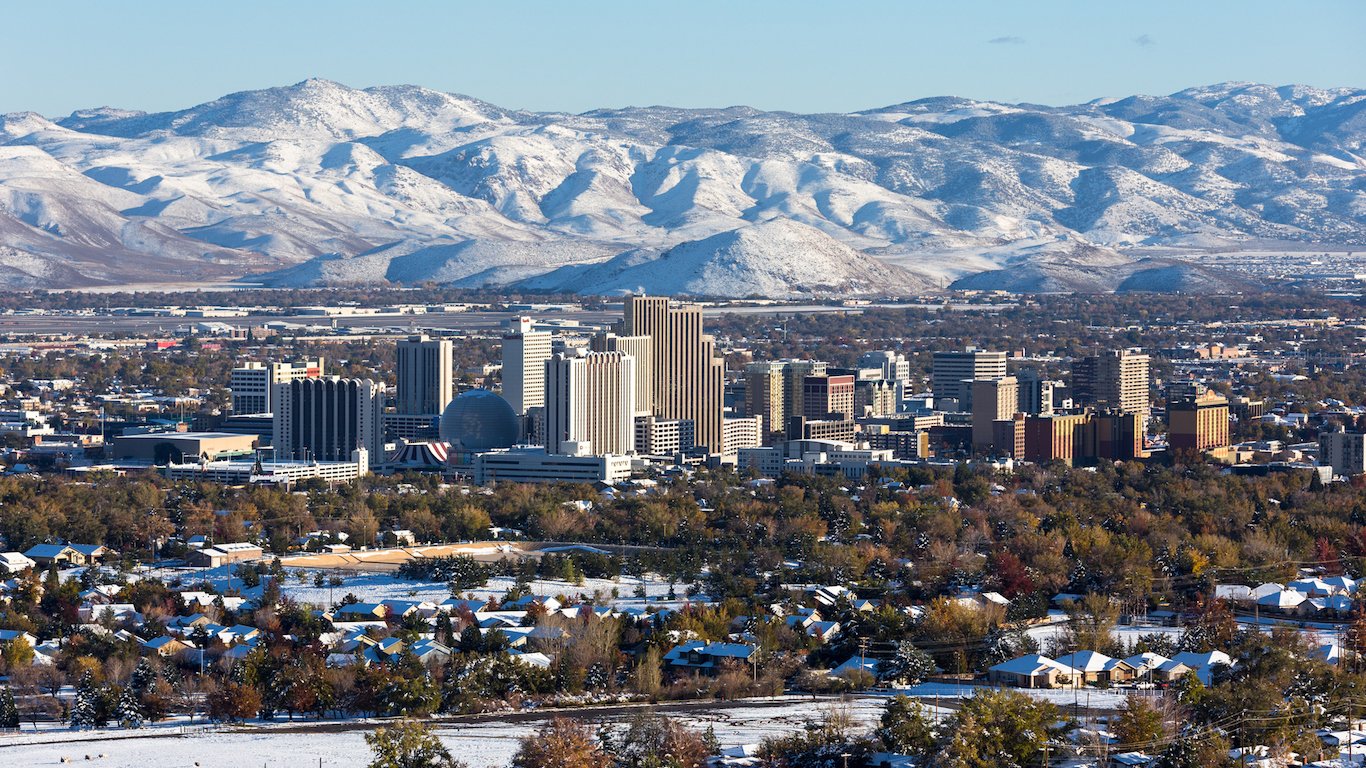

While college tuition has more than doubled over the past 30 years, the share of Americans who have graduated from college continues to rise. According to the most recent statistics from the U.S. Census Bureau, 32.0% of all U.S. adults 25 and over have at least a bachelor’s degree, up from 31.3% in 2016 and 17.0% in 1980.
The share of adults with a bachelor’s degree varies greatly from state to state. Many of the state-level disparities in educational attainment parallel disparities in income, as well as socioeconomic factors such as unemployment, industry composition, and population growth.
To determine America’s most and least educated states, 24/7 Wall St. reviewed the percentage of adults age 25 and over with at least a bachelor’s degree with data from the U.S. Census Bureau’s 2017 American Community Survey.
Click here to see the full list of America’s most and least educated states.
Click here to see our detailed findings and methodology.

1. Massachusetts
> Pct. of adults with at least a bachelor’s degree: 43.4%
> Median earnings for bachelor’s degree holders: $62,167 (2nd highest)
> Median household income: $77,385 (4th highest)
> 2017 unemployment: 3.7% (tied — 16th lowest)
In Massachusetts, 43.4% of adults have at least a four-year college degree, the highest share of any state. The share of adults with a bachelor’s degree has increased considerably faster in the state than the nation as a whole. The share increased 0.7 percentage points from a 42.7% share in 2016. Adults with college degrees are more likely to have higher-paying jobs than those with only a high school education. In Massachusetts, the median annual household income is $77,385, the fourth largest among states nationwide.
[in-text-ad]

2. Colorado
> Pct. of adults with at least a bachelor’s degree: 41.2%
> Median earnings for bachelor’s degree holders: $52,074 (16th highest)
> Median household income: $69,117 (11th highest)
> 2017 unemployment: 2.8% (4th lowest)
Many high-paying jobs are often only accessible to workers with a college degree. In Colorado, 41.2% of adults have at least a bachelor’s degree, up from 39.9% in 2016. That 1.3 percentage point increase was one of the largest among states. Nationwide, the college degree attainment rate is 32.0%. Among state workers, 13.9% are employed in the professional, scientific, and management sector, the third largest such share of any state. In states with a smaller share of adults who attended college, it is likely a lower share of the workforce would be employed in the industry, which tends to require college graduates.

3. Maryland
> Pct. of adults with at least a bachelor’s degree: 39.7%
> Median earnings for bachelor’s degree holders: $61,640 (3rd highest)
> Median household income: $80,776 (the highest)
> 2017 unemployment: 4.1% (tied — 22nd lowest)
States with above average educational attainment rates tend to have more affluent populations, and Maryland is no exception. Nearly 40% of adults in the New England state have at least a bachelor’s degree, the third highest share nationwide. In part due to the state’s highly educated workforce, Maryland’s median household income of $80,776 a year is higher than any other state in the country. It also exceeds the national annual median household income of $60,336 by over $20,000.

4. New Jersey
> Pct. of adults with at least a bachelor’s degree: 39.7%
> Median earnings for bachelor’s degree holders: $63,545 (the highest)
> Median household income: $80,088 (2nd highest)
> 2017 unemployment: 4.6% (tied — 17th highest)
About 39.7% of adults in New Jersey have at least a bachelor’s degree, tied with Maryland for the third highest share nationwide. In general, higher education results in higher annual incomes, and in New Jersey, a four-year college degree is more valuable than in most other states. The typical worker with a college education in the state earns $63,545 a year, the highest earnings of any state and well above the annual national median earnings for bachelor’s degree holders of $52,484 a year.
[in-text-ad-2]

5. Virginia
> Pct. of adults with at least a bachelor’s degree: 38.7%
> Median earnings for bachelor’s degree holders: $58,191 (8th highest)
> Median household income: $71,535 (9th highest)
> 2017 unemployment: 3.8% (tied — 19th lowest)
A concentration of employment in sectors with a high share of white collar jobs is often indicative of higher educational attainment across a population. In Virginia, 15.7% of workers are employed in the professional, scientific, and management sector — the largest share of any U.S. state. Employment in the sector is made possible in part by the relatively large share of adults in Virginia with a bachelor’s degree.

6. Connecticut
> Pct. of adults with at least a bachelor’s degree: 38.7%
> Median earnings for bachelor’s degree holders: $61,520 (4th highest)
> Median household income: $74,168 (5th highest)
> 2017 unemployment: 4.7% (tied — 14th highest)
The 38.7% of adults who have at least a bachelor’s degree in Connecticut earn a median of $61,520 a year — the fourth highest income for those with this level of education across all states. Adults with a bachelor’s degree have a greater earning potential than those without. In Connecticut, the difference in annual earnings between those with at least a bachelor’s degree and those with just a high school diploma is $27,047, the fourth largest educational earnings gap nationwide.
[in-text-ad]

7. Vermont
> Pct. of adults with at least a bachelor’s degree: 38.3%
> Median earnings for bachelor’s degree holders: $40,592 (2nd lowest)
> Median household income: $57,513 (24th lowest)
> 2017 unemployment: 3.0% (6th lowest)
In Vermont, 38.3% of adults have attained at least a four-year college degree as of 2017, an increase of 1.9 percentage points since 2016 — the third largest jump nationwide. Though higher educational attainment often translates to higher earnings, a college diploma in Vermont provides a relatively small boost in earnings potential compared to other states. The typical worker in Vermont with at least a bachelor’s degree earns just $40,592 a year, only about $9,600 more than a worker with only a high school education. For perspective, the typical American worker with a bachelor’s degree earns $52,484 a year, compared to the $30,624 the typical worker with a high school education earns — a difference of nearly $22,000 a year.

8. New Hampshire
> Pct. of adults with at least a bachelor’s degree: 36.9%
> Median earnings for bachelor’s degree holders: $56,249 (13th highest)
> Median household income: $73,381 (6th highest)
> 2017 unemployment: 2.7% (3rd lowest)
Nearly 37% of adults in the state have a bachelor’s degree, above the national share of 32%. Adults with at least a four-year college degree tend to have an advantage finding stable employment, and this appears to be especially the case in New Hampshire. Only 2.7% of the state’s labor force was out of a job in 2017, the third lowest annual unemployment rate among states, and well below the 4.4% of unemployed nationwide last year.

9. Minnesota
> Pct. of adults with at least a bachelor’s degree: 36.1%
> Median earnings for bachelor’s degree holders: $56,347 (12th highest)
> Median household income: $68,388 (12th highest)
> 2017 unemployment: 3.5% (tied — 13th lowest)
In Minnesota, over 93.1% of adults have a high school diploma, the highest share in the country and well above the national high school attainment rate of 88.0%. Graduating from high school is the first step to earning a higher education, and so in states where a relatively high share of adults have a high school diploma, college attainment rates are high as well. Of the state’s adults, 36.1% have earned at least a four-year college degree as of 2017 — the ninth highest share in the nation — up 1.3 percentage points from 2016.
A well-educated population is more likely to have higher salaries and less likely to face financial hardship. Only 9.5% of Minnesota residents live below the poverty line, the fourth of smallest poverty rate of all states and well below the 13.4% U.S. poverty rate.
[in-text-ad-2]

10. New York
> Pct. of adults with at least a bachelor’s degree: 36.0%
> Median earnings for bachelor’s degree holders: $60,027 (6th highest)
> Median household income: $64,894 (14th highest)
> 2017 unemployment: 4.7% (tied — 14th highest)
New York state has a high concentration of white collar jobs that require a bachelor’s degree. For example, the state’s information sector is the third largest in the country relative to its workforce. New York also has an above average share of workers employed within the finance and insurance sectors. New York also has below average shares of workers employed in industries that are less likely to require a college education as a prerequisite to employment. These industries include retail and construction.

11. Washington
> Pct. of adults with at least a bachelor’s degree: 35.5%
> Median earnings for bachelor’s degree holders: $59,662 (7th highest)
> Median household income: $70,979 (10th highest)
> 2017 unemployment: 4.8% (tied — 12th highest)
In Washington state, 35.5% of adults have a bachelor’s degree, far more than the national college attainment rate of 32.0%. College graduates are more likely to have high-paying jobs than those with less educational attainment, and across the United States, workers with a bachelor’s degree earn $21,860 more per year than those with a high school diploma. The median household income in Washington of $70,979 a year is the 10th highest of any state and far more than the national median household income of $60,336.
[in-text-ad]

12. Utah
> Pct. of adults with at least a bachelor’s degree: 34.6%
> Median earnings for bachelor’s degree holders: $47,092 (15th lowest)
> Median household income: $68,358 (13th highest)
> 2017 unemployment: 3.2% (tied — 8th lowest)
Those who have graduated from college are more likely to have high-paying jobs than those who have not. The share of adults in Utah who have at least a four-year college degree has increased considerably since 2013. In 2017, 34.6% of adults in the state had a bachelor’s degree, a 3.3 percentage point increase from 2013, the fourth largest increase nationwide over that period. The increase in the higher educational attainment among adults in Utah occurred simultaneously with an increase in median household income in the state. In 2013, the median household income was $62,813 a year. By 2017, that figure increased to $68,383.

13. Illinois
> Pct. of adults with at least a bachelor’s degree: 34.4%
> Median earnings for bachelor’s degree holders: $56,643 (11th highest)
> Median household income: $62,992 (16th highest)
> 2017 unemployment: 5.0% (tied — 6th highest)
In Illinois, 34.4% of adults have at least a bachelor’s degree, more than the 32.0% national share. College-educated adults are far more likely to hold high-paying jobs than those with less educational attainment. Nationwide, workers with a college education earn approximately $22,000 more annually than workers with a high school education. In Illinois, the typical household earns $62,992 a year, more than the national median household income of $60,336 a year.

14. Kansas
> Pct. of adults with at least a bachelor’s degree: 33.7%
> Median earnings for bachelor’s degree holders: $49,257 (21st lowest)
> Median household income: $56,422 (21st lowest)
> 2017 unemployment: 3.6% (15th lowest)
Over the past five years, the share of adults with a bachelor’s degree in Kansas has risen from 31.3% in 2013 to 33.7% in 2017. Individuals with higher educational attainment are more likely to have stable, high-paying jobs, and the rise in the share of adults with a bachelor’s degree in Kansas may have contributed to income growth in the state. From 2013 to 2017, the median annual household income in Kansas rose from $53,682 to $56,422. Despite the high college attainment rate and income growth, the median household income in the state is still below the national median of $60,336.
[in-text-ad-2]

15. Oregon
> Pct. of adults with at least a bachelor’s degree: 33.7%
> Median earnings for bachelor’s degree holders: $48,567 (18th lowest)
> Median household income: $60,212 (20th highest)
> 2017 unemployment: 4.1% (tied — 22nd lowest)
Populations with higher educational attainment tend to have higher incomes, and this can be seen among workers in Oregon. An estimated 33.7% of adults in Oregon have a bachelor’s degree, up a full percentage point from 2016. This increase has likely contributed to the slight increase in the state’s median household income. The typical household in Oregon earns $60,212 a year, up from $58,742 in 2016 and roughly in line with the $60,336 national median household income. While incomes in Oregon are in line with the national figure, a larger share of residents depend on food stamps than in a majority of states. Some 15.4% of Oregon residents receive SNAP benefits, the fourth largest share nationwide

16. California
> Pct. of adults with at least a bachelor’s degree: 33.6%
> Median earnings for bachelor’s degree holders: $60,940 (5th highest)
> Median household income: $71,805 (8th highest)
> 2017 unemployment: 4.8% (tied — 12th highest)
Just 83.3% of adults in California have a high school diploma, far less than the 88.0% of adults nationwide and the smallest share of any state. Areas with low high school attainment rates are less likely to attract advanced companies, and they often have lower incomes and lower college attainment rates overall. In California, however, 33.6% of adults have a bachelor’s degree, more than the national college attainment rate of 32.0%. Similarly, the typical household in the state earns $71,805 a year, far more than the $60,336 the typical household earns nationwide and the eight highest median household income of any state.
[in-text-ad]

17. Rhode Island
> Pct. of adults with at least a bachelor’s degree: 33.5%
> Median earnings for bachelor’s degree holders: $55,749 (14th highest)
> Median household income: $63,870 (15th highest)
> 2017 unemployment: 4.5% (21st highest)
The share of adults in Rhode Island who have at least a bachelor’s degree remained effectively unchanged over the past year. As of 2017, 33.5% of adults had at least a four-year college degree, more than the 32.0% national college attainment rate.
Trends in educational attainment tend to parallel those in income. In Rhode Island, however, incomes in the state grew substantially as the college attainment rate remained statistically stagnant. The median household income in Rhode Island rose $2,411 from $61,459 in 2016 to $63,870 in 2017, the fifth largest increase nationwide.

18. Hawaii
> Pct. of adults with at least a bachelor’s degree: 32.9%
> Median earnings for bachelor’s degree holders: $50,803 (24th highest)
> Median household income: $77,765 (3rd highest)
> 2017 unemployment: 2.4% (the lowest)
Over the past five years, the share of adults with a bachelor’s degree in Hawaii rose from 31.2% in 2013 to 32.9% in 2017. Individuals with a bachelor’s degree are more likely to hold advanced, high-paying jobs than those with less educational attainment, and the increase in the share of college graduates in Hawaii may have partially contributed to income growth in the state. The median annual household income in Hawaii rose from $71,566 in 2013 to $77,765 in 2017, now the third highest income of any state.
While incomes in Hawaii are among the highest of any state, the state is one of the most expensive places to live. Goods and services in Hawaii cost 18.4% more than they do nationwide, and the typical home is worth $617,400 — each the highest such figure of any state.

19. Montana
> Pct. of adults with at least a bachelor’s degree: 32.3%
> Median earnings for bachelor’s degree holders: $40,244 (the lowest)
> Median household income: $53,386 (14th lowest)
> 2017 unemployment: 4.0% (21st lowest)
While higher educational attainment tends to lead to higher incomes in general, Montana is a notable exception. Even though 32.3% of adults have a bachelor’s degree, above the national share of 32.0%, adults in the state report incomes lower than the national median. The typical household in Montana earns $53,386 a year, far less than the $60,336 national median household income.
One factor contributing to the discrepancy between college attainment and income in Montana may be the relatively low value of a college degree in the state. The typical worker with a bachelor’s degree in Montana earns just $40,244 a year, the least of any state and just $11,866 more than the median annual earnings for adults with a high school education — the second smallest earnings advantage nationwide.
[in-text-ad-2]

20. Maine
> Pct. of adults with at least a bachelor’s degree: 32.1%
> Median earnings for bachelor’s degree holders: $44,118 (7th lowest)
> Median household income: $56,277 (20th lowest)
> 2017 unemployment: 3.3% (tied — 10th lowest)
From 2016 to 2017, the share of adults with a high school education in Maine remained unchanged at 92.3%. While high school attainment is strongly correlated with college attainment, the share of adults with a bachelor’s degree in Maine rose from 30.1% to 32.1% over the same period — the largest increase of any state. Maine’s college attainment rate surpassed the national figure, which rose from 31.3% in 2016 to 32.0% in 2017. Individuals with a college degree are more likely to hold high-paying jobs than those with less educational attainment, and over the same period, the median household income in Maine rose from $54,212 to $56,277 — the seventh largest increase of any state.

21. Nebraska
> Pct. of adults with at least a bachelor’s degree: 31.7%
> Median earnings for bachelor’s degree holders: $50,138 (24th lowest)
> Median household income: $59,970 (21st highest)
> 2017 unemployment: 2.9% (5th lowest)
While the share of adults with a bachelor’s degree in Nebraska climbed from 30.2% in 2015 to 31.4% in 2016, the increase was much smaller between 2016 and 2017. Today, 31.7% of adults in Nebraska have a bachelor’s degree, just below the national college attainment rate of 32.0%. States with higher educational attainment tend to report higher incomes. While the college attainment rate in Nebraska remained statistically stagnant over the past year, incomes in the the state increased substantially. The typical household in Nebraska earned $59,970 in 2017, up $1,961 from 2016 — the ninth largest income increase nationwide. Nebraska also has has one of the lowest unemployment rates in the country at 2.9%, the fifth lowest unemployment rate of all states.
[in-text-ad]

22. Delaware
> Pct. of adults with at least a bachelor’s degree: 31.5%
> Median earnings for bachelor’s degree holders: $57,157 (9th highest)
> Median household income: $62,852 (17th highest)
> 2017 unemployment: 4.6% (tied — 17th highest)
Delaware is one of several states without a statistically significant change in educational attainment over the last year. The share of adults with a bachelor’s degree rose only slightly from 2016 to 2017, from 31.0% to 31.5%. Education is one of the primary determinants of wealth, and the state’s median annual household income also remained relatively stagnant, creeping up about $250 from $62,596 to $62,852. Delaware’s college attainment rate and median household income remain roughly in line with the national figures of 32.0% and $60,336.

23. Pennsylvania
> Pct. of adults with at least a bachelor’s degree: 31.4%
> Median earnings for bachelor’s degree holders: $51,950 (17th highest)
> Median household income: $59,195 (24th highest)
> 2017 unemployment: 4.9% (tied — 9th highest)
The share of adults with a bachelor’s degree increased in Pennsylvania over the last five years, from 28.7% in 2013 to 31.4% in 2017. Workers with at least a four-year college degree are more likely to hold more advanced, high-paying jobs than workers who just have a high school diploma. As college attainment rose in Pennsylvania, so did the median household income, jumping from $54,811 in 2013 to $59,195 in 2017.

24. North Carolina
> Pct. of adults with at least a bachelor’s degree: 31.3%
> Median earnings for bachelor’s degree holders: $50,105 (23rd lowest)
> Median household income: $52,752 (13th lowest)
> 2017 unemployment: 4.6% (tied — 17th highest)
Over the past five years, educational attainment has risen in North Carolina as more college graduates flocked to the state. The state’s population rose by 4.3% from 2013 to 2017, one of the fastest percentage increases of any state. The share of adults with a bachelor’s degree rose from 28.4% in 2013 to 31.3% in 2017, the 10th largest increase nationwide. College graduates are more likely to have high-paying jobs and report higher incomes overall. Over the same period, the median household income in North Carolina rose from $48,344 in 2013 to $52,752 in 2017.
[in-text-ad-2]

25. Georgia
> Pct. of adults with at least a bachelor’s degree: 30.9%
> Median earnings for bachelor’s degree holders: $51,915 (18th highest)
> Median household income: $56,183 (19th lowest)
> 2017 unemployment: 4.7% (tied — 14th highest)
The share of adults in Georgia who have at least a four-year college degree has not changed drastically in the past year, growing from 30.5% in 2016 to 30.9% in 2017, a mere 0.4 percentage-point increase. Individuals with higher educational attainment are typically more well off financially than those who have not received a college-level education. The increase in college attainment in Georgia over the past year may have partially contributed to income growth in the state. From 2016 to 2017, the median household income in Georgia rose $1,457 from $54,726 to $56,183. Nationwide, the median household income rose $1,516 from $58,820 to $60,336.

26. North Dakota
> Pct. of adults with at least a bachelor’s degree: 30.7%
> Median earnings for bachelor’s degree holders: $50,270 (25th lowest)
> Median household income: $61,843 (18th highest)
> 2017 unemployment: 2.6% (2nd lowest)
In North Dakota, 30.7% of adults have a bachelor’s degree, less than the 32.0% national college attainment rate. While relatively few adults in North Dakota have a college degree, the state has a comparatively high concentration of high-paying opportunities for adults without a college education. A recent oil boom, which saw the annual production of crude oil in the state increase more than tenfold from 2006 to 2015, created a number of lucrative mining jobs that require just a high school diploma. Some 9.2% of workers in North Dakota are employed in the mining and agriculture sector, the second largest share of any state, and 7.9% are employed in construction, the fifth largest share. Overall, the median annual earnings for workers with just a high school education in North Dakota is $36,102, the highest such figure of any state.
[in-text-ad]

27. Wisconsin
> Pct. of adults with at least a bachelor’s degree: 30.4%
> Median earnings for bachelor’s degree holders: $51,162 (22nd highest)
> Median household income: $59,305 (22nd highest)
> 2017 unemployment: 3.3% (tied — 10th lowest)
Some 30.4% of adults in Wisconsin have a bachelor’s degree, less than the 32.0% national share. The earning potential for individuals with a bachelor’s degree is far higher than for those with less education, and the typical U.S. worker with a college degree earns approximately $22,000 more than the typical worker with a high school education. This can help explain why incomes in Wisconsin are slightly lower than incomes nationwide. The typical household in Wisconsin earns $59,305 a year, slightly less than the national median household income of $60,336.

28. Florida
> Pct. of adults with at least a bachelor’s degree: 29.7%
> Median earnings for bachelor’s degree holders: $45,651 (9th lowest)
> Median household income: $52,594 (12th lowest)
> 2017 unemployment: 4.2% (tied — 24th lowest)
Educational attainment in Florida has improved in recent years. From 2016 to 2017, the share of adults with a high school diploma improved from 87.4% to 88.4%, the fourth largest increase of any state. Over the same period, the share of adults with at least a bachelor’s degree increased 1.1 percentage points from 28.6% to 29.7%, also one of the largest increases in the country — yet still below the national college attainment rate of 32.0%.
One pull factor for college graduates moving to Florida may have been the state’s high concentration of advanced, high-paying industries. Some 7.7% of the workforce is employed in finance and insurance, and 13.1% in professional scientific, and management services, each the seventh largest share of any state. According to a November 2015 study by the Population Studies Center of the University of Michigan, 80.9% of college graduates in Florida are from out-of-state, the fourth largest share in the country.

29. Texas
> Pct. of adults with at least a bachelor’s degree: 29.6%
> Median earnings for bachelor’s degree holders: $54,211 (15th highest)
> Median household income: $59,206 (23rd highest)
> 2017 unemployment: 4.3% (tied — 23rd highest)
Some 29.6% of adults in Texas have a bachelor’s degree, below the national average of 32.0%. The earnings potential for college graduates is far higher than for individuals with lower levels of education, and nationwide workers with a college degree earn approximately $22,000 more per year than workers with just a high school diploma. The low college attainment rate in Texas may partially contribute to the state’s low income level. The typical household in Texas earns $59,206 a year, slightly less than the national median household income of $60,336.
[in-text-ad-2]

30. Arizona
> Pct. of adults with at least a bachelor’s degree: 29.4%
> Median earnings for bachelor’s degree holders: $51,197 (21st highest)
> Median household income: $56,581 (23rd lowest)
> 2017 unemployment: 4.9% (tied — 9th highest)
Arizona adults are slightly less likely to have a college education than American adults overall. In the state, 29.4% of adults have at least a bachelor’s degree, compared to the 32.0% of adults nationwide. One factor contributing to Arizona’s low college attainment rate may be the state’s unhealthy job market, which can deter college graduates from moving to the state. Arizona’s unemployment rate is one of the highest in the country at 4.9%, much greater than the U.S. unemployment rate of 4.4%.

31. Missouri
> Pct. of adults with at least a bachelor’s degree: 29.1%
> Median earnings for bachelor’s degree holders: $48,238 (17th lowest)
> Median household income: $53,578 (15th lowest)
> 2017 unemployment: 3.8% (tied — 19th lowest)
Missouri adults are less likely to have graduated college than American adults on the whole. Only 29.1% of adults in Missouri have a bachelor’s degree, below the national college attainment rate of 32.0%. Individuals with a college diploma are more likely to have high-paying, advanced jobs, and are more wealthy overall. The typical household in Missouri earns $53,578 a year, less than the national median household income of $60,336.
[in-text-ad]

32. Michigan
> Pct. of adults with at least a bachelor’s degree: 29.1%
> Median earnings for bachelor’s degree holders: $51,527 (20th highest)
> Median household income: $54,909 (18th lowest)
> 2017 unemployment: 4.6% (tied — 17th highest)
In line with the national trend, the share of adults in Michigan with a bachelor’s degree improved slightly in 2017. Still, the 29.1% of adults in the state with a college education remains below the comparable rate in most states.
While adults in Michigan are less likely to have a college education than American adults on the whole, they are more likely to have a high school education. Some 90.9% of adults in the state have high school education, higher than the 88.0% of American adults who have similar education.

33. Iowa
> Pct. of adults with at least a bachelor’s degree: 28.9%
> Median earnings for bachelor’s degree holders: $50,840 (23rd highest)
> Median household income: $58,570 (25th highest)
> 2017 unemployment: 3.1% (7th lowest)
Though Iowa adults are not among the most likely to have a four-year college degree, they are among the most likely to have a high school education. Iowa’s high school attainment rate of 92.1% is the 10th highest off all states.
Iowa has a high concentration of workers in jobs that typically do not require a college degree. Some 3.8% of workers are employed in the agriculture sector, 14.6% in manufacturing, and 2.9% in wholesale trade — the ninth, sixth, and fourth largest shares of any state.

34. Alaska
> Pct. of adults with at least a bachelor’s degree: 28.8%
> Median earnings for bachelor’s degree holders: $56,914 (10th highest)
> Median household income: $73,181 (7th highest)
> 2017 unemployment: 7.2% (the highest)
Unlike in a majority of states, the share of adults in Alaska with a bachelor’s degree declined last year — from 29.6% in 2016 to 28.8% in 2017. Educational attainment trends typically parallel income trends, and in Alaska, as educational attainment dropped so did the state’s median household income. The typical household in Alaska earned $73,181 in 2017, a considerable drop of $4,722 from the median household income of $77,903 in 2016. The unemployment rate in the state also rose in 2017 — to 7.2% from 6.9% the year before. This is inconsistent with the national trend of declining employment. Nationwide, the jobless rate fell from 4.9% in 2016 to 4.4% in 2017. Alaska currently has the highest share of unemployed workers in the nation.
[in-text-ad-2]

35. South Dakota
> Pct. of adults with at least a bachelor’s degree: 28.1%
> Median earnings for bachelor’s degree holders: $44,805 (8th lowest)
> Median household income: $56,521 (22nd lowest)
> 2017 unemployment: 3.3% (tied — 10th lowest)
Some 28.1% of adults in South Dakota have a bachelor’s degree, far below the national college attainment rate of 32.0%. Areas with low educational attainment are less likely to attract advanced, high-paying industries, and they are often less wealthy overall. In South Dakota, just 6.3% of workers are employed in the traditionally high-paying field of professional, scientific, management, or administrative services, the smallest share of any state. The typical household in the state earns $56,251 a year, less than the national median household income of $60,336.

36. South Carolina
> Pct. of adults with at least a bachelor’s degree: 28.0%
> Median earnings for bachelor’s degree holders: $46,928 (14th lowest)
> Median household income: $50,570 (9th lowest)
> 2017 unemployment: 4.3% (tied — 23rd highest)
In South Carolina, 28.0% of adults have at least a bachelor’s degree, well below the national college attainment rate of 32.0%. College-educated workers in the state can expect to earn nearly $20,000 more per year than adults who did not continue their education past high school. The typical worker with a high school education earns just $27,178 a year, the fourth lowest median earnings of any state. A relatively large share of South Carolinians work in manufacturing — a career that typically does not require a high level of specialization and often pays low wages.
[in-text-ad]

37. Ohio
> Pct. of adults with at least a bachelor’s degree: 28.0%
> Median earnings for bachelor’s degree holders: $51,684 (19th highest)
> Median household income: $54,021 (16th lowest)
> 2017 unemployment: 5.0% (tied — 6th highest)
Just 28.0% of adults in Ohio have a bachelor’s degree, far less than the national college attainment rate of 32.0%. Individuals with a college diploma are more likely to have high-paying, advanced jobs, and are more wealthy overall. In Ohio, the typical household earns $54,021 a year, less than the national median household income of $60,336.
One factor contributing to Ohio’s low college attainment rate may be the state’s unhealthy job market, which can deter college graduates from moving to the state. Some 5.0% of the state’s workforce is unemployed, tied with Illinois and Nevada as the sixth highest unemployment rate nationwide.

38. Wyoming
> Pct. of adults with at least a bachelor’s degree: 27.6%
> Median earnings for bachelor’s degree holders: $47,546 (16th lowest)
> Median household income: $60,434 (19th highest)
> 2017 unemployment: 4.2% (tied — 24th lowest)
The share of adults who have at least a four-year college degree in Wyoming remained effectively unchanged over the past year. Today, 27.6% of adults have at least a bachelor’s degree, well below the comparable national share of 32.0%. Wyoming, however, is home to a high share of adults with a high school education. Nearly 93% of adults have a high school diploma, the fourth largest share among all states and above the national high school attainment rate of 88.0%.
Many of the jobs in Wyoming, a state rich in natural resources, may not require a college degree. For example, 10.1% of Wyoming’s workforce works within the agriculture, forestry, and mining industries — the largest share nationwide. Wyoming also has some of the largest shares of workers employed in the transportation and warehousing and construction sectors.

39. Tennessee
> Pct. of adults with at least a bachelor’s degree: 27.3%
> Median earnings for bachelor’s degree holders: $46,779 (12th lowest)
> Median household income: $51,340 (10th lowest)
> 2017 unemployment: 3.7% (tied — 16th lowest)
While the share of adults with at least a bachelor’s degree in Tennessee rose from 26.1% in 2016 to 27.3% in 2017 — one of the largest increases of any state — the state’s college attainment rate remains far below the 32.0% national rate. College graduates report higher incomes than those with less education on average, likely contributing to the increase in incomes in the state. The median household income in the state rose from $49,524 in 2016 to $51,340 in 2017 — one of the largest increases nationwide. Still, Tennessee remains one of the less wealthy states, with a median income far below the $60,336 national median.
[in-text-ad-2]

40. New Mexico
> Pct. of adults with at least a bachelor’s degree: 27.1%
> Median earnings for bachelor’s degree holders: $42,379 (5th lowest)
> Median household income: $46,744 (5th lowest)
> 2017 unemployment: 6.2% (2nd highest)
New Mexico is one of several states without a statistically significant increase in college attainment from 2016 to 2017. The share of adults with a bachelor’s degree actually fell slightly from 27.2% to 27.1%. The decline in college attainment coincided with a slight, albeit statistically insignificant, drop in income. The median household income in New Mexico fell from $47,386 in 2016, then the sixth lowest of any state, to $46,744 in 2017, the fifth lowest.
One factor deterring college graduates from moving to New Mexico may be the state’s unhealthy job market. In 2017, 6.2% of New Mexico’s workforce was unemployed, the second highest unemployment rate nationwide.

41. Idaho
> Pct. of adults with at least a bachelor’s degree: 26.8%
> Median earnings for bachelor’s degree holders: $42,188 (4th lowest)
> Median household income: $52,225 (11th lowest)
> 2017 unemployment: 3.2% (tied — 8th lowest)
Just 26.8% of adults in Idaho have a bachelor’s degree, far less than the 32.0% national college attainment rate. The lack of high-paying, advanced industry in Idaho may be one factor contributing to the small share of college graduates in the state. Just 4.9% of workers in the state are employed in finance and insurance, 9.4% in professional, scientific, and management services, and 22.2% in educational and health care services, each among the smallest such shares of any state. A bachelor’s degree may also have less value in Idaho compared to other states, as workers with a college degree earn just $13,546 more a year on average than high school graduates — the third smallest earnings advantage of any state.
[in-text-ad]

42. Indiana
> Pct. of adults with at least a bachelor’s degree: 26.8%
> Median earnings for bachelor’s degree holders: $50,294 (25th highest)
> Median household income: $54,181 (17th lowest)
> 2017 unemployment: 3.5% (tied — 13th lowest)
Nationwide 32.0% of adults have a bachelor’s degree. In Indiana, only 26.8% do. While the share of Indiana adults who have at least a four-year college degree may still be below the national average, it has improved considerably since 2013, when just 23.8% of adults had a bachelor’s degree. The 3 percentage-point increase is the ninth largest of all states.

43. Oklahoma
> Pct. of adults with at least a bachelor’s degree: 25.5%
> Median earnings for bachelor’s degree holders: $46,203 (10th lowest)
> Median household income: $50,051 (8th lowest)
> 2017 unemployment: 4.3% (tied — 23rd highest)
Just 25.5% of adults in Oklahoma have a bachelor’s degree, far less than the 32.0% national share. The earnings potential for college graduates is far higher than for individuals with lower levels of education, and nationwide, workers with a college degree earn approximately $22,000 more per year than workers with just a high school diploma. The low college attainment rate in Oklahoma may partially contribute to the state’s low income level. The typical household in the state earns $50,051 a year, far less than the $60,336 the typical U.S. household earns and the eighth lowest median household income of any state.

44. Alabama
> Pct. of adults with at least a bachelor’s degree: 25.5%
> Median earnings for bachelor’s degree holders: $49,520 (22nd lowest)
> Median household income: $48,123 (6th lowest)
> 2017 unemployment: 4.4% (22nd highest)
While educational attainment is improving in Alabama, it is still one of the least educated states in the nation. From 2016 to 2017, the share of adults with a high school diploma increased from 85.1% to 86.5%, the largest percentage-point jump in the country, yet still far below the national high school attainment rate of 88.0%. The increase in high school attainment coincided with an increase in both the share of adults with a college education and the state median household income. The share of adults with at least a bachelor’s degree rose from 24.7% in 2016 to 25.5% in 2017, and the median household income rose from $47,157 to $48,123. Still, the college attainment rate and median household income in Alabama are far below the national figures of 32.0% and $60,336.
[in-text-ad-2]

45. Nevada
> Pct. of adults with at least a bachelor’s degree: 24.9%
> Median earnings for bachelor’s degree holders: $48,974 (20th lowest)
> Median household income: $58,003 (25th lowest)
> 2017 unemployment: 5.0% (tied — 6th highest)
Just 24.9% of adults in Nevada have a bachelor’s degree, far less than the 32.0% national college attainment rate and the sixth smallest share of any state. Just 86.8% of adults in the state have a high school diploma, the 10th smallest share. One factor deterring college graduates from moving to Nevada may be the state’s unhealthy job market. In 2017, 5.0% of the state’s workforce was unemployed, the sixth highest unemployment rate of any state. Additionally, the value of a college diploma in Nevada may be relatively low compared to other states. The typical college graduate earns $17,766 a year more than high school graduates, one of the smaller earnings advantages of any state.

46. Kentucky
> Pct. of adults with at least a bachelor’s degree: 24.0%
> Median earnings for bachelor’s degree holders: $46,881 (13th lowest)
> Median household income: $48,375 (7th lowest)
> 2017 unemployment: 4.9% (tied — 9th highest)
Earning a college education is one of the most effective ways for individuals to increase their earning potential. Only 24.0% of adults in Kentucky have at least a four-year college degree, the fifth lowest share nationwide. The typical household in Kentucky earns just $43,375 a year, the seventh lowest income among all states. One factor that may deter college graduates from moving to Kentucky may be the state’s unhealthy job market. Some 4.9% of the workforce are unemployed, the ninth highest unemployment rate in the country and well above the national rate of 4.4%.
[in-text-ad]

47. Louisiana
> Pct. of adults with at least a bachelor’s degree: 23.8%
> Median earnings for bachelor’s degree holders: $48,795 (19th lowest)
> Median household income: $46,145 (4th lowest)
> 2017 unemployment: 5.1% (tied — 4th highest)
Just 23.8% of adults hold a bachelor’s degree in Louisiana, the fourth lowest share in the country. The low college attainment rate may help explain why so many in the state struggle financially. Louisiana’s poverty rate of 19.7% is the second highest of U.S. states. Some 6.6% of Louisiana families live on $10,000 or less annually. No state has a greater share of families living with such a low income. Louisiana’s unemployment rate of 5.1% is one of the highest in the country.

48. Arkansas
> Pct. of adults with at least a bachelor’s degree: 23.4%
> Median earnings for bachelor’s degree holders: $46,483 (11th lowest)
> Median household income: $45,869 (3rd lowest)
> 2017 unemployment: 3.7% (tied — 16th lowest)
Arkansas has the third lowest college attainment rate of all states. Just 23.4% of adults have a bachelor’s degree, well below the comparable national share of 32.0%. Adults with college degrees are more likely to have higher paying jobs than those with only a high school education, and the low college attainment rate in Arkansas has likely contributed to the state’s low incomes. The median household income of just $45,869 a year in the state is well below the national median income of $60,336 a year, and the third lowest nationwide.

49. Mississippi
> Pct. of adults with at least a bachelor’s degree: 21.9%
> Median earnings for bachelor’s degree holders: $41,706 (3rd lowest)
> Median household income: $43,529 (2nd lowest)
> 2017 unemployment: 5.1% (tied — 4th highest)
The share of adults in Mississippi who have a bachelor’s degree remained effectively unchanged from 2016 to 2017. With just 21.9% of the adult population in the state holding a four-year college degree — 10.1 percentage points below the national college attainment rate of 32.0% — Mississippi is the second least educated state in the nation. Lower educational attainment typically leads to lower-paying jobs and a greater likelihood of facing financial hardship. In Mississippi, the typical household earns $43,529 a year, the second lowest median income nationwide. Mississippi also has the largest share of residents living in poverty at 19.8%, well above the national poverty rate of 13.4%.
[in-text-ad-2]

50. West Virginia
> Pct. of adults with at least a bachelor’s degree: 20.2%
> Median earnings for bachelor’s degree holders: $43,516 (6th lowest)
> Median household income: $43,469 (the lowest)
> 2017 unemployment: 5.2% (3rd highest)
West Virginia is the least educated state in the nation, with only about one in five adults holding a bachelor’s degree. A college degree tends to increase workers’ earning potential and helps them avoid serious financial hardship. West Virginia has the lowest median household income in the nation at just $43,469 a year, far below the national median annual income of $60,336. Across the state, 16.8% of adults rely on government assistance in the form of food stamps, the second highest recipiency rate of all states.
Detailed Findings & Methodology
Individuals with a bachelor’s degree generally have a higher earning potential than those with lower levels of education and are more likely to report higher incomes overall. Nationwide, the median annual earnings for workers with a college degree of $52,484 is 71.4% greater than the median earnings of $30,624 for workers with just a high school diploma.
The difference in earning potential between college and non-college graduates likely contribute to income differences at the state level. In nine of the 10 states with the highest college attainment rate, the median household income is higher than the national annual median of $60,336.
One of the factors most affecting college attainment is the share of adults who have graduated from high school. A high school diploma is a requirement for most four-year colleges and universities.
While homegrown college graduates often account for the largest share of a state’s college-educated population, in a number of states, graduates from out of state account for the largest share of the college-educated population. According to a November 2015 study by the Population Studies Center of the University of Michigan, 57.5% of the U.S. college-educated population is living in a different state than they were born in. In some states, migrants from out of state comprise more than 80% of the total college-educated population.
As a result, college attainment is largely determined by a state’s ability to attract and retain college graduates. Many of the states with the highest college attainment rates are home to the nation’s top universities. While the 10 states with the highest college attainment rates are home to 36 of the top 100 national universities, according to the U.S. News & World Report rankings, just four of the top 100 universities are in the 10 states with the lowest college attainment rates.
One of the largest pull factors for college graduates is the health of the local job market. Over the past year, the college attainment rate increased substantially in a number of states with low unemployment. In 12 of the 15 states with the largest percentage-point increases in college attainment from 2016 to 2017, the annual unemployment rate is below the 4.4% national figure.
Similarly, college graduates tend to move to states where college degrees are more valuable — where they would have a greater earning advantage. Nationwide, the median earnings for workers with a bachelor’s degree is $22,000 greater than that of workers with a high school education. In all 20 of the states with the lowest college attainment rates, the difference in earnings between college- and high school-educated workers is less than the national figure.
States with high college attainment rates also tend to have more advanced, high-paying employment opportunities for college graduates. The states with the highest college attainment rates have large shares of workers employed in the educational and health care services, professional, scientific, and management services, finance and insurance, and information sectors, all of which tend to be high-paying.
To determine America’s most and least educated states, 24/7 Wall St. reviewed the percentage of adults age 25 and over with at least a bachelor’s degree with data from the U.S. Census Bureau’s 2017 American Community Survey. The percentage of adults who have completed at least high school or its equivalent also comes from the 2017 ACS. Median household income, population, employment by industry, food stamp recipiency, and poverty rates also come from the 2017 ACS. We also reviewed annual average unemployment data from the Bureau of Labor Statistics for 2017 and 2016.
Take This Retirement Quiz To Get Matched With A Financial Advisor (Sponsored)
Take the quiz below to get matched with a financial advisor today.
Each advisor has been vetted by SmartAsset and is held to a fiduciary standard to act in your best interests.
Here’s how it works:
1. Answer SmartAsset advisor match quiz
2. Review your pre-screened matches at your leisure. Check out the
advisors’ profiles.
3. Speak with advisors at no cost to you. Have an introductory call on the phone or introduction in person and choose whom to work with in the future
Take the retirement quiz right here.
Thank you for reading! Have some feedback for us?
Contact the 24/7 Wall St. editorial team.
 24/7 Wall St.
24/7 Wall St.
